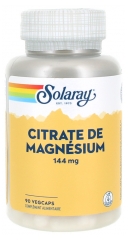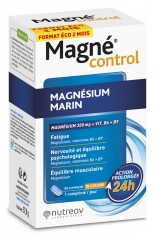Magnesium, a heart-friendly mineral
Written by Paul Musset, Doctor in Pharmacy | published on | updated on 15/04/2024

Nervousness, fatigue, muscle spasms… What if you aren’t getting enough magnesium? Among the mineral salts essential for our bodies to function properly, magnesium is one of the frontrunners, as it participates in around 300 metabolic reactions. Let’s get to know this big-hearted mineral.
What is magnesium?
Magnesium is a metal and a chemical element (Mg). It is very abundant on our planet, coming in fourth place after iron, oxygen and silicon. Its name comes from the name of a Greek city, Magnesia, which was surrounded by numerous deposits of magnesia (a white mineral made up of magnesium carbonate, used by athletes on their palms or feet to avoid slipping).
In 1618, it drew attention in the small town of Epsom, England, where cows refused to drink the water from a pond due to its bitter taste. An English chemist analysed it in 1715 and found magnesium. Half a century later, another scientist, Humphry Davy, succeeded in using electrolysis to isolate the pure magnesium from this salt. Epsom salt is still available on the market as a food supplement source of magnesium.
Today, magnesium is widely used in industry and chemistry. As it is very light compared to other metals, it is used in aeronautics, for example. But it has many other uses and properties, such as in the form of magnesium oxide, which is appreciated for its resistance to very high temperatures (over 2,000 °C), making it suitable for use in the composition of bricks and blast furnaces.
The main functions of magnesium in our body
Magnesium plays an essential role in the functioning of our bodies, where it is abundantly present, half in the skeleton and half in the muscles and the rest of the body. It is involved in more than 300 metabolic reactions. Its most well-known functions are related to the transmission of nerve impulses (messages transmitted by neurons via neurotransmitters) and the regulation of muscle contractions. Calcium ions cause muscle cells to contract.
Magnesium controls the entry and exit of this calcium into the cells, allowing muscle fibres to relax after exercise. Speaking of muscles, it is worth remembering that the heart is a very important muscle. It has been shown that a sufficient level of magnesium provides protection from cardiovascular diseases. It also helps to maintain normal blood pressure, preventing hypertension. It increases the level of good cholesterol in the blood, which helps to prevent atherosclerosis.
It also helps to regulate blood glucose levels. It was found that hypomagnesemia, i.e. a lack of magnesium, increases insulin resistance, which can be a first step towards diabetes. Magnesium is also involved in lipid metabolism and many other chemical reactions in the body.
Did you know?
Haemoglobin is a molecule in the blood that transports oxygen to the organs. Its structure is made up of an iron atom surrounded by nitrogen, carbon, oxygen, etc. It just so happens that plants have a very important molecule that is nearly identical, except that a magnesium atom replaces the central iron atom. This molecule is chlorophyll, the green pigment necessary for photosynthesis (which forms glucose and releases oxygen from carbon dioxide thanks to light energy).
Symptoms of magnesium deficiency
The percentage of magnesium in the blood, around 1%, is not really representative of the amount present in the body. It is also difficult to diagnose magnesium deficiency using a blood test. However, there are a few signs that do act as alarm bells:
- Exacerbated nervousness, irritability, stress and anxiety, even depression
- Difficulty sleeping, especially with falling asleep
- Muscle cramps, tremors (eyelids in particular), tingling sensations
- Spasmophilia (which seems to be linked in many patients to a magnesium deficiency in the cells)
- Nausea, dizziness
- Accelerated or irregular heartbeat
It should be noted that certain factors favour hypomagnesemia: all digestive diseases such as Crohn’s disease, celiac disease, intestinal malabsorption syndrome, following digestive surgery, etc. As does alcoholism. Some drugs may also decrease the absorption of magnesium: diuretics, certain antibiotics, immunosuppressants and oral contraceptives. Ask your doctor for more information.
The beneficial effects of magnesium
Magnesium has a preventive and protective effect rather than a curative effect once the problems have occurred. It often acts in synergy with vitamin B6.
- It plays a protective role against cardiovascular diseases.
- It prevents the onset of diabetes.
- It prevents the formation of kidney stones.
- It relieves premenstrual pain and migraines (both caused by spasms).
- It prevents cramps and regulates nervous impulses, especially restless leg syndrome in pregnant women.
- Studies have shown that a majority of children with ADHD (Attention Deficit Hyperactivity Disorder) are lacking in magnesium.
- It prevents osteoporosis by helping to bind calcium.
- It helps to reduce the pain associated with fibromyalgia.
- It reduces nervousness and anxiety, as well as spasmophilia attacks.
The various forms of magnesium
Magnesium comes in the form of a “salt”, i.e. in combination with other elements. Some forms are better than others for their ease of assimilation as well as for the mildness of their side effects (intestinal transit problems). Here are some of them:
- Magnesium citrate is the most “bioavailable”, i.e. the best assimilated.
- Marine magnesium is particularly rich in the element of magnesium, although it is not the most assimilable form.
- Magnesium lactate is a widely available form on the market. Its disadvantage is that it contains lactic acid, which can cause muscle soreness.
- Magnesium glycerophosphate is of interest for its high bioavailability and low laxative effect.
- There is also magnesium chloride, magnesium gluconate, magnesium pidolate, etc.
Do not hesitate to test several forms of magnesium to find the one that suits you best.
Magnesium food supplements to protect the balance
If you think you are deficient in magnesium, make sure you eat more unrefined cereals, seeds, pulses, nuts, wheat germ, brewer’s yeast and even dark chocolate … Cocooncenter offers many magnesium food supplements, carefully chosen for their effectiveness and quality. Tablets, capsules, vials, magnesium in combination or not with vitamins and other substances, etc. There is something to allow everyone, both adults and children to enjoy the all the benefits of magnesium.
Magnesium is such an abundant element on Earth that it would be a pity to suffer from a deficiency! A course of magnesium treatment a few weeks before winter can help maintain your peace of mind and protect the proper functioning of your body.
Three key points to remember about magnesium:
- Magnesium is essential for so many metabolic functions that you must make sure you get enough in every season to maintain your health.
- Choosing the right dose and a well assimilated form allows you to get the most out of its benefits: a child does not need the same amount as a pregnant woman or an athlete.
- In the event of renal insufficiency, it may be dangerous to take magnesium supplements without medical advice. It is also best to take it at a different time from antibiotics and, in general, to always talk to your doctor if you are undergoing treatment.



















